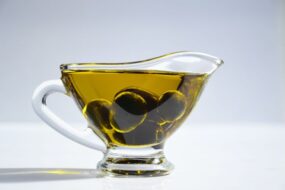
Are you looking for a natural and healthy way to lose weight? Look no further than white vinegar! Consuming vinegar has long been touted for its numerous health benefits, including its potential to aid weight loss. This article will explore 20 simple ways to consume white vinegar for weight loss and the science behind its effectiveness.
Table of Contents (click to expand)
Understanding White Vinegar and Its Nutritional Value
Before diving into how to consume white vinegar, let’s first talk about what it is and its nutritional value. White vinegar, also known as distilled white vinegar, is made from grain alcohol and has a very high acetic acid content. It is highly acidic and should not be consumed on its own.
One tablespoon of white vinegar contains only 3 calories and no fat. It also has trace amounts of calcium, iron, and potassium.
Compared to other types of vinegar, such as apple cider vinegar, white vinegar has a milder taste and aroma. It is often used in cooking, baking, and cleaning.
Health Benefits of White Vinegar
White vinegar has numerous health benefits, including promoting blood sugar control, reducing cholesterol levels, aiding in weight loss, and having antimicrobial properties.
Blood Sugar Control
One of the most significant benefits of white vinegar consumption is its potential to promote glycemic control. Numerous studies have shown that vinegar can help regulate blood sugar levels and improve insulin sensitivity in people with impaired glucose tolerance or type 2 diabetes.
In one study, participants who consumed vinegar before a high-carbohydrate meal had lower blood sugar levels than those who did not consume vinegar. This effect was attributed to the acetic acid in the vinegar, which slows down the rate at which food leaves the stomach and enters the small intestine.
Reduced Cholesterol Levels
White vinegar has also been shown to help reduce cholesterol levels. In one study, rats fed a high-cholesterol diet and given vinegar had lower triglyceride levels than those who did not receive vinegar.
Antimicrobial Properties
White vinegar also has antimicrobial properties that can help fight off infections. It has been used for centuries as a natural remedy for various ailments, including skin infections, nail fungus, ear infections, and wound healing.
Acetic Acid in White Vinegar
Acetic acid is the critical component in white vinegar that provides these health benefits. Acetic acid is a short-chain fatty acid produced during the fermentation process of vinegar.
Research suggests that acetic acid can aid weight loss by increasing feelings of fullness, reducing caloric intake, and boosting metabolism. It interferes with the body’s glucose uptake and lipid metabolism.
One study found that consuming vinegar with a high-carbohydrate meal increased fullness and reduced calorie intake for the rest of the day. Another study found that acetic acid can increase the expression of genes that promote fat burning and decrease the expression of genes that promote fat storage.
How Much White Vinegar Should You Consume?
While white vinegar has many potential health benefits, it should be consumed in moderation. Too much vinegar can adversely affect your health, such as damaging tooth enamel or irritating the throat and stomach lining.
The recommended daily intake of white vinegar is 1-2 tablespoons diluted in water or other beverages. It’s important to note that consuming vinegar in supplement form is not recommended, as it can lead to serious health problems.
Preparing White Vinegar for Consumption
There are several ways to consume white vinegar, but it’s essential to dilute it first to avoid its highly acidic nature. One way to prepare a drink with white vinegar is to mix 1-2 tablespoons of vinegar with 8 ounces of water or another beverage, such as tea or lemonade.
Add white vinegar to your salad dressings, marinades, soups, or stir-fry dishes. It can also be used as a cleaning or leavening agent in baked goods.
White Vinegar vs. Apple Cider Vinegar
When consuming vinegar for weight loss and other health benefits, apple cider vinegar is often mentioned alongside white vinegar. But what’s the difference between the two?
Apple cider vinegar is made from fermented apple juice and has a darker color and stronger flavor than white vinegar. It also has a lower acetic acid content and contains other beneficial compounds, such as malic acid and pectin.
While both types of vinegar have potential health benefits, studies have shown that acetic acid, the main component in white vinegar, is the most effective at promoting weight loss and blood sugar control.
One study found that consuming 1-2 tablespoons of apple cider vinegar daily for 12 weeks led to a modest reduction in body weight but did not significantly affect blood sugar levels or lipid metabolism.
Drinking White Vinegar for Weight Loss
Drinking white vinegar diluted with water or other beverages is one of the most popular ways to consume vinegar for weight loss. But does it work?
Some studies suggest that drinking vinegar before a meal can help reduce calorie intake and aid in weight loss by promoting feelings of fullness. However, the effects are minor and may not be significant enough to cause substantial weight loss without other lifestyle changes to boost weight loss, such as a healthy diet and exercise plan.
It’s also important to note that drinking vinegar alone can harm your health, as it is highly acidic and can damage tooth enamel or irritate the throat and stomach lining. Always dilute the vinegar with water or other beverages before consuming.
How White Vinegar Aids Weight Loss
So, how exactly does white vinegar aid weight loss? The main mechanism for losing weight is acetic acid, which has been shown to have several effects on the body that can promote weight loss.
Increased Fullness
One of the ways acetic acid promotes weight loss is by increasing feelings of fullness. Studies have shown that consuming vinegar before a meal can lead to decreased calorie intake for the rest of the day, possibly due to its effects on slowing down stomach emptying and increasing feelings increase fullness of satiety.
Reduced Caloric Intake
Another way acetic acid can aid weight loss is by reducing caloric intake. In one study, participants who consumed vinegar before a high-carbohydrate meal ate fewer calories for the rest of the day than those who did not consume vinegar. This effect was stronger in people with a higher body mass index (BMI).
Boosted Metabolism
Acetic acid may also boost metabolism by increasing the expression of genes that promote fat burning and decreasing the expression of genes that promote fat storage. One study found that acetic acid increased AMP-activated protein kinase (AMPK) activity, an enzyme involved in lipid metabolism and glucose uptake.
Lowered Blood Sugar Levels
Finally, acetic acid can help regulate blood sugar levels by slowing down the rate at which food leaves the stomach and when low blood sugar enters the small intestine. Studies have shown that consuming vinegar before a high-carbohydrate meal can lower blood sugar levels in people with impaired glucose tolerance or type 2 diabetes.
Other Potential Health Benefits of White Vinegar
In addition to aiding weight loss and promoting blood sugar control, white vinegar has other potential health benefits.
Heart Health
Studies have suggested that consuming vinegar can help reduce the risk of heart disease by lowering cholesterol levels and blood pressure. One study found that consuming two tablespoons of vinegar daily for eight weeks decreased waist circumference, triglyceride levels, and blood pressure in overweight individuals.
Antimicrobial Properties
White vinegar also has antimicrobial properties that can help fight off infections. It has been used for centuries as a natural remedy for various ailments, including skin infections, nail fungus, ear infections, and wound healing.
Cleaning Agent
White vinegar is also a natural cleaning agent used to clean various surfaces in your home. Its high acidity makes it effective at breaking down dirt and grime, while its antimicrobial properties help kill germs and bacteria.
Are There Any Risks to Consuming White Vinegar?
While white vinegar has many potential health benefits, it should be consumed in moderation and diluted with water or other beverages to avoid adverse effects on your health.
Excessive vinegar consumption can lead to gastrointestinal problems, such as stomach pain, nausea, and diarrhea. It can also damage tooth enamel or irritate the throat and stomach lining if consumed undiluted.
In addition, vinegar can interact with certain medications, such as heart medications and diuretics, and may affect blood sugar levels in people with diabetes. Always consult with your healthcare provider before adding vinegar to your diet if you are taking any medications or have a medical condition.
20 Simple Ways to Consume White Vinegar for Weight Loss
Here are 20 simple ways to consume white vinegar for weight loss:
- Drinking white vinegar diluted in water
- Adding white vinegar to your tea or coffee
- Using white vinegar as a salad dressing, mixed with olive oil
- Adding white vinegar to your smoothie
- Taking white vinegar pills or capsules
- Mixing white vinegar with honey and warm water
- Adding white vinegar to your soup
- Drinking a mixture of white vinegar and baking soda
- Adding white vinegar to your stir-fry
- Drinking white vinegar mixed with pomegranate juice
- Adding white vinegar to your marinade for grilled chicken or fish
- Drinking white vinegar mixed with lemon juice
- Adding white vinegar to your salsa or guacamole
- Drinking white vinegar mixed with ginger and honey
- Adding white vinegar to your vegetable juice
- Drinking white vinegar mixed with maple syrup and warm water
- Adding white vinegar to your gazpacho
- Drinking white vinegar mixed with cinnamon and honey
- Adding white vinegar to your coleslaw, mixed with mayonnaise
- Drinking white vinegar mixed with turmeric and warm water
Conclusion
In conclusion, white vinegar can aid in weight loss and has numerous health benefits. However, it should be consumed in moderation and diluted with water or other beverages to avoid adverse effects on your health.
Incorporating white vinegar into your healthy diet, exercise plan, and portion control can help you achieve your weight loss goals. While more research is still needed on the effectiveness of white vinegar for weight loss, its potential health benefits make it a great addition to your diet.
If you’re considering adding vinegar to your diet or have questions about how much to consume, consult a registered dietitian nutritionist or talk to your healthcare provider.





































